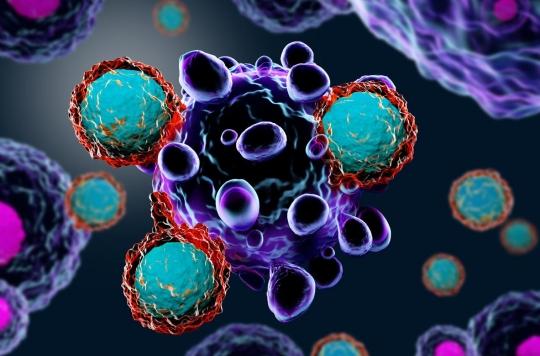For the first time, a French team has succeeded in predicting the development of lung cancer by measuring the immune response of patients to precancerous lesions.

Can we prevent the appearance of lung cancer by analyzing the immune system as soon as the first precancerous cells appear?
The Inserm research team led by Jérôme Galon attempted to answer this question. In an article published on June 26 in the journal Naturethis research director has shown that the use of immunotherapies at a very early stage, that is to say as soon as precancerous cells appear, can help prevent the disease.
Outsmart the mechanisms of the immune system
Already at the origin of work having shown that the progression of cancer depends, among other things, on the presence and functionality of T lymphocytes in the tumor microenvironment, the research team here focused on the response of the immune system when precancerous cells appear.
Indeed, the immune response is activated as soon as they appear, at very early stages. But this immune response “is accompanied simultaneously by the establishment of mechanisms responsible for blocking it, allowing the progression of cancer”, explain the researchers in a press release. “Suffice to say that when cancer occurs, a good part of the immune surveillance but also the mechanisms that allow it to escape have already taken place.”
The challenge is therefore to understand how the immune system functions when precancerous cells appear. Currently, monitoring of precancerous lesions in lung cancer allows them to be removed if doctors have the slightest suspicion that they are at risk of giving rise to cancer.
A specific response at each stage
This new study shows that it is possible to target the immune system to fight against the aggravation of precancerous lesions. The researchers analyzed 122 lung biopsies from smokers at risk of cancer. They presented all stages of lesions, precancerous and cancerous.
For each biopsy, they studied the immune system in the tumor microenvironment by carrying out a genomic study of the cells present. This work enabled them to characterize the nature, quantity and arrangement of the different immune players in the tumor microenvironment at each pre-cancerous and cancerous stage. They were thus able to compare the evolutionary trajectories of the cancer and the immune response and observe that the immune system did not react in the same way.
For example, at an extremely early stage of lung cancer, the team observed an activation of local immune cells and the arrival of naïve T lymphocytes, ie not educated to specifically destroy abnormal cells. On the other hand, at a more advanced stage, specific B and T lymphocytes appear for abnormal cells and an establishment of the memory immune response. But this activation is also accompanied by the appearance of blocking points (“checkpoints”), as well as suppressive cytokines, molecules also intended to block the immune response. “This means that the functioning of the immune system is already impaired before the appearance of the cancer itself”, write the researchers.
For Professor Galon’s team, this discovery is important and could “eventually have repercussions on the care of patients”. Not only because it should make it possible to “better predict the risks of progression of pre-cancerous lesions towards cancers”, but also because it “would seem that the use of immunotherapies intended to remove immune blocking points, famous checkpoints, could be beneficial to patients at early stages in cancer prevention”.

.














